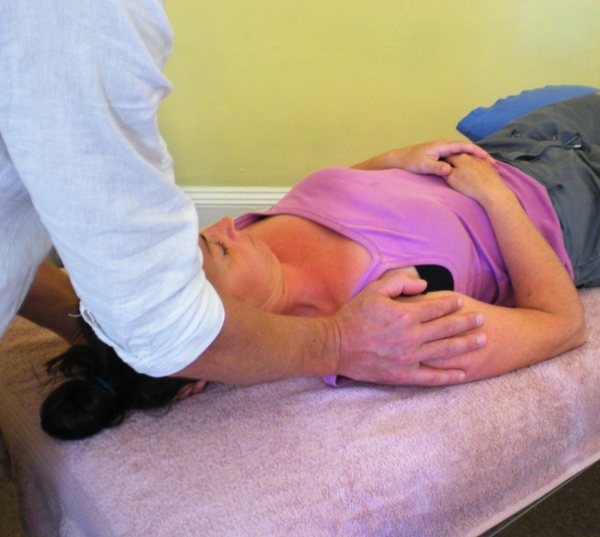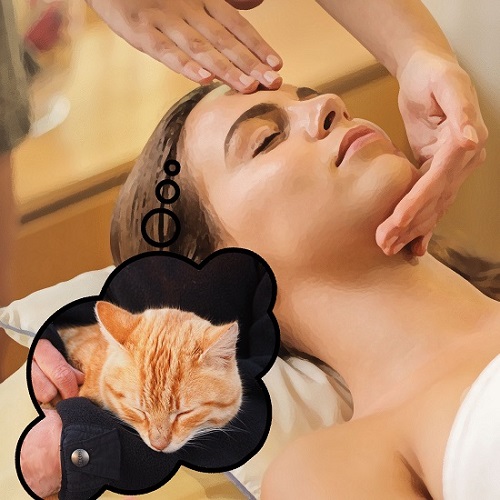Positive Health Online
Your Country

Touch the Forgotten Sense
listed in bodywork, originally published in issue 283 - January 2023
Having been working with touch modalities for 25 years I witness constantly the power of positive, nurturing touch. At the end of just a single session, a client seems not just relaxed, but in a better place. When they return for a second session they are very often less awkward and agitated more “themselves”. Yet in this digital age when we are more than ever connected via technology, research shows we are decreasingly connected in a true, meaningful human way, we are currently experiencing less touch than ever before with less time spent engaging in positive face to face interactions. Research shows we are hard wired to receive nurturing touch, we have evolved in such a way that we are programmed to want, to need touch, yet in today’s world many of us are touch-deprived. So what are the implications to our touch-deprived on society?
The Power of Positive, Nurturing Touch
Acknowledgement: previously in author’s article Issue 278
Re-integrate Patterns of Overwhelm, Trauma and Emotional Holding
Professor Richard McGlone, a neuroscientist interested in the fundamental importance of touch, explains that there are two types of nerve cells through which we experience touch, to simplify things, these can be termed ‘fast’ and ‘slow’.
I am going to explore the ‘slow’ sensory nerve fibres in more detail. These are found in skin with hairs – all skin except for palms of the hands, soles of the feet and lips – these afferent touch receptors directly impact on how we feel – their major property is to help regulate our emotional states. They are considered slow as they take 1-2 seconds to deliver messages to the brain and are stimulated by pleasant slow stroking. Interesting that they are not in the hand, the ‘tool’ which delivers touch.
The ‘fast’ nerve cells found in the skin receptors in palms of hands, soles of the feet and lips – are involved with delivering message of touch from the outside world – sending quick signals to the brain in order to protect us, if for example we pick up a hot pan the fast cells carry a message to alert us and we immediately let go. This sensation of pain is transitory and there is no emotion attached. There are also many fast cells in muscles and joints that play an important role in proprioception. Fascinatingly blind people can interpret brail, with messages from ‘fast’ receptors in their fingertips, faster than we can read text, which demonstrates the efficiency of the ‘fast’ nerve cells.
The ‘slow’ touch nerves, known as C afferent nerves, kick in a few seconds later and have an emotional aspect – they let us know how we feel; their major function is to help regulate our emotional states. Through gentle stroking these are stimulated to let us know we are safe. In fact research shows that our sense of self, our identity is imprinted on the developing brain through touch.
The first two years of life are fundamental to brain development, and close physical contact is essential for optimal brain development. The importance of touch for new-born babies is widely recognized, with skin-to-skin contact encouraged immediately after birth, to help regulate the babies’ breathing, heartbeat and blood sugar levels as well as forging bonds between parents and their child. Professor McGlones, research looks at pre-tem infants. The medical professional can now keep pre-term infants alive from 23 weeks, intervention keeps the heart ticking and lungs clear, but what has not been recognised “is that 25% of these babies develop full blown autism, and all pre-term babies will have some cognitive deficit throughout their life” – what do all these babies share? They have little or no touch while in the incubator which could be up to 2-3 months. New research from Milan shows that the babies who are in-fact touched while in the incubator are discharged earlier than those not touched. Link between touch and autism is highly contentious; however Professor McGlone believes there is a link. The pre-term babies are physically alive and well, but the little person without touch is going to suffer, they are going to experience a sense of neglect and lack of safety as touch is a fundamental requirement of life, and plays a fundamental role in the development of the social brain. Premature babies miss out on the sensory experiences of late gestation, the amniotic fluid washing over them, being rubbed against womb wall, as well as being stroked through the abdomen. All of this touch is removed in the pre-term baby when placed in the incubator, as well as the mother’s nurturing touch; this has adverse effects on the development of the social brain.
The emergence and increased understanding of Epigenetics in some ways replaces the nature, nurture debate. Are we our just the expression of our genes or does nurture play a part? Are we in fact the sum of our life experiences? Epigenetics gives recognition to how the environment affects us and how certain genes are turned on or off, depending on experiences. Research with rats, which is also relevant to humans demonstrates the importance of touch to create a calm, socially balanced, happy adult (rat or human).
Further research into touch by Michael Meany took place on two populations of rat mothers: one group were “high lick” mothers who frequently groomed their pups, one group were “low lick” mothers. In the rat population, to lick and groom is the equivalent of nurturing touch. What the researched showed is that “high lick” rat pups had a well-developed stress regulatory system in their brain; they could withstand every day stress and could self-regulate. On the other hand, “low lick” rat pups had a red alert stress system, unable to self-regulate in stressful situations. This suggests the seeding bases for many psychological and psychiatric disorders that develop through life stem from early life adversity, or lack of touch.
In essence lack of touch, which is perceived as neglect, impacts on genes which regulate stress; if we are not touched enough in a loving way as infants, our stress response will be adversely affected throughout life. Simply put, without loving touch as a child we will be less resilient to stress for the rest of our life. The implications are huge.
Conversely a child who receives positive, caring nurturing touch, becomes a happy, balanced self-regulating adult.
These ‘slow’ C tactile nerve fibres evolved to provide reward signals that build relationships between primates – historically we were safer in groups, communities or tribes of people; the best way to protect the species was as part of a community, not as an individual. Therefore those who do not get enough touch during development – will experience negative consequences on the social brain, find it hard to build relationships – as is seen in those with Autism or Asperger’s. The lack of touch – or reward – is interpreted as being unsafe, putting infants (and eventually adults) on high alert, and seeking reward in other places. This where addictive behaviours come in to play – in order to block out our suffering and pain. Addiction comes in so many forms, anything from screen and sugar addiction to workaholics, shopaholics or obsessive compulsive behaviour, to name a few. These addictive behaviours are on the rise, perhaps in part, due to the current lack of positive societal touch.
The last part of Professor McGlones research which is fascinating, is that these C tactile afferent nerve fibres which innovate the skin, respond to gentle touch. They are attuned to the exact speed that we instinctively stroke or massage each other which is 3-5cm per second. Experiments done to compare stroking rates on skin to other inanimate objects like a table top vary enormously. When stroking inanimate objects our rate of stroking is erratic; however when working skin on skin, we naturally attune to the pace that the C tactile neurons respond to – 3-5cm per second. Amazing – yet reassuring that we still have the innate capacity to attune to others in this high-tech world.
Sadly we are currently living in a climate where society demonizes touch, a lot of negative touch is reported in the media, which adversely affects our relationship to touch. Fear of touch has entered our society; both the teaching and medical fraternity report being scared of physical contact in case of the touch being misconstrued. Our brain is consciously reacting to input, if we constantly receive info – for example through negative reporting in the media –that touch is risky and contentious, or even dangerous; we will believe that. Sadly this will adversely affect the mental health of our society, as touch is a fundamental human requirement. Although the negative touch episodes are clearly taking place, perhaps there is also a place to report on positive touch experience, to keep things in balance.

Professor Frances McGlone’s research demonstrates how simple every-day touch impacts our life:
- If a waiter taps you on the shoulder when they give you the bill – you tip more – just from that touch;
- Basketball teams who have more hands on interaction in a match, work better as a team, perform better and move higher up the league table;
- Those who are touched when they visit a library, reported a more positive experience.
We are hard wired to receive human touch, we touch technology all the time, we know the texture and shape of our phone, we know where the letters are on the keyboard, but do we still know what nurturing touch feels like? Do we still recognize its benefit?
Research shows we are currently experiencing less touch than ever before, which will have implications on our society; is this perhaps one reason for the mental health epidemic we are experiencing in society today?
Professor McGlone suggests the seeding bases for many psychological and psychiatric disorders that develop through life stem from early life adversity, due to lack of nurturing touch, which affects our neurophysiology. Are we having a mental health crisis in the younger generation because they simple were not touched enough? If so, the larger implications on society are potentially devastating. In our highly sophisticated “developed- world” the basic human need of touch is frequently not being met. Women are sometimes returning to work within days or weeks after giving birth, either to protect their career or because they cannot afford not to work. Infants are put into care, perhaps with lack of close physical contact, which will adversely affect the development of the social brain.
The take home intervention for society and individuals is we need to prioritise touch. We as bodywork therapist are in a prime position to spread the word on the importance of touch and to help others; clients as well as friends and family. The good news is, if we look at neuroplasticity we know that the brain can change throughout life – so regular positive touch – through massage, can help clients self-regulate more effectively and make improvements in peoples stress response.
As Professor McGlone says: “Touch is not just a sentimental human indulgence, it’s a biological necessity”. Perhaps many of us have come to see touch as something additional, something extra, something we’ll make space for ‘if we have time’ rather than an element of our lives, that is fundamental to wellbeing.
Comments:
-
No Article Comments available
